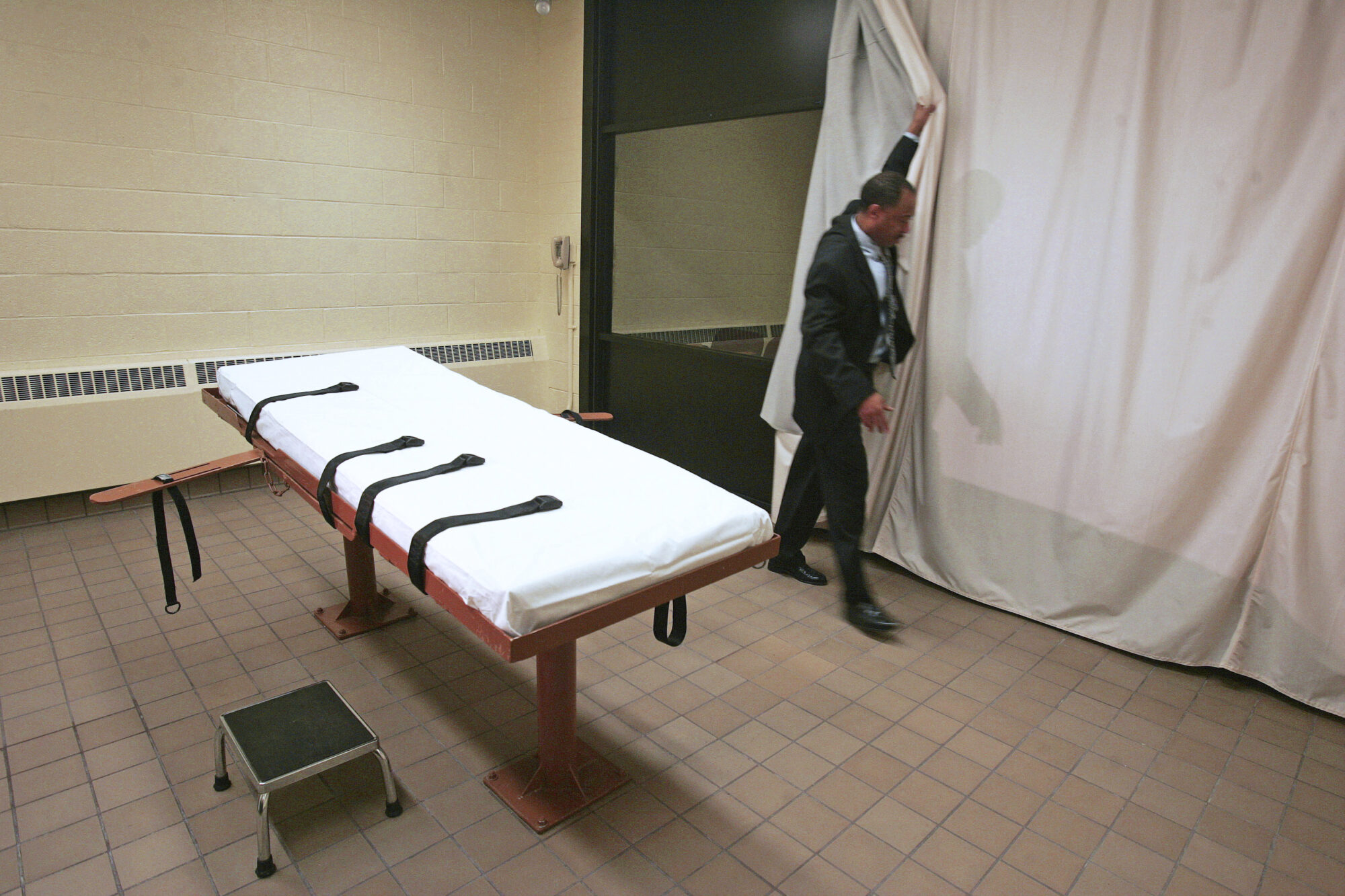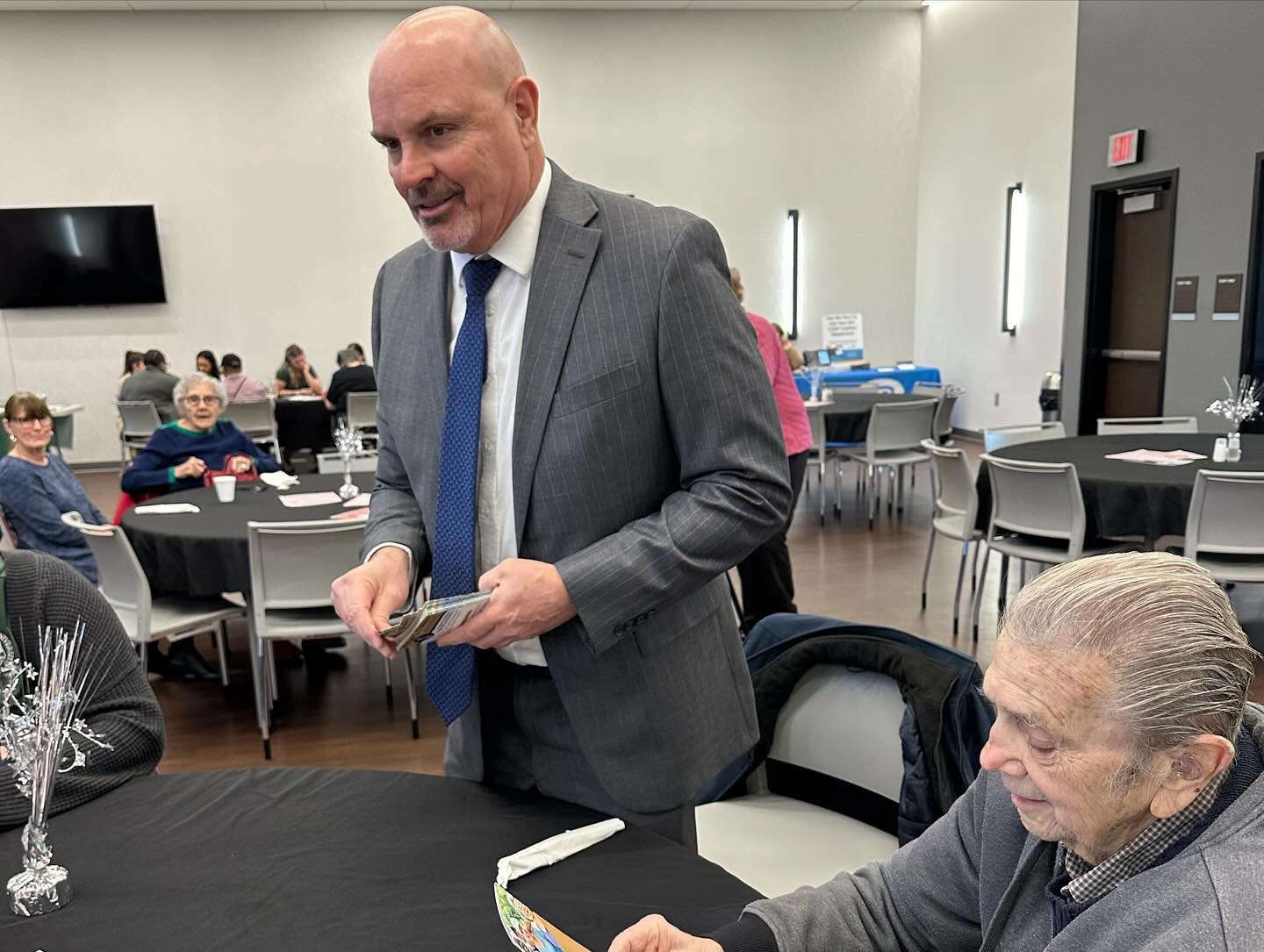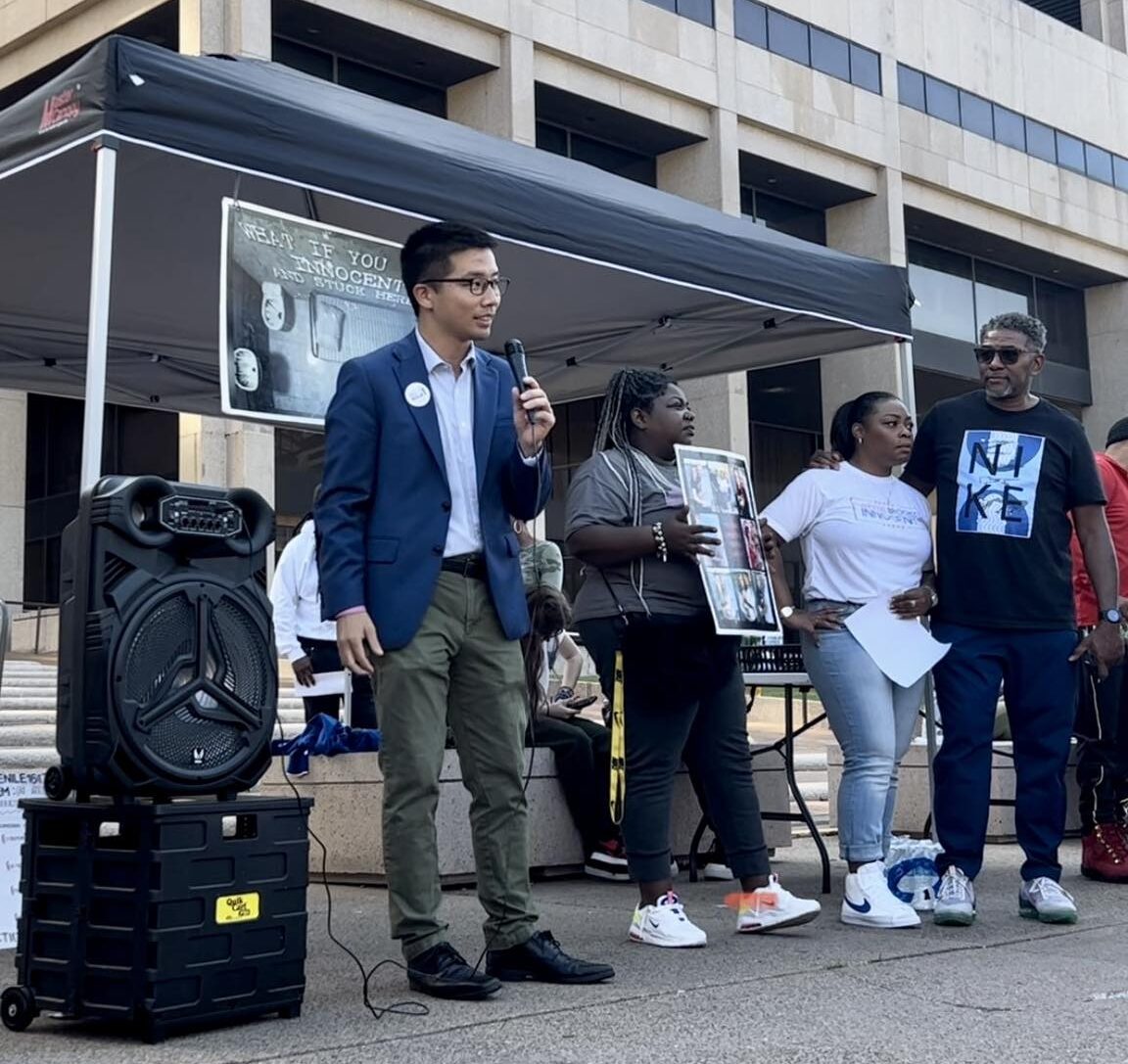In Cleveland Prosecutor’s Office, a Long Trail of Death Sentences and Wrongful Convictions
Michael O’Malley, up for reelection next week, has worked to keep people on death row, amid dysfunction in his conviction review unit and a threat that executions may resume.
| March 15, 2024

Cuyahoga County, home to Cleveland, Ohio, once led the nation in death sentences. In 2018 and 2019, Cuyahoga County prosecutors sent five people to death row, more than anywhere else in the country during that time. Prosecuting Attorney Michael O’Malley, a Democrat who took office in 2016 and is running for reelection next week, defended his decision to repeatedly seek the death penalty and said it was warranted because those cases were particularly brutal.
“We don’t invite these type of crimes in our community,” O’Malley told cleveland.com at the end of 2019. “But when they happen, the citizens of our community have made clear that they want the option [of capital punishment].”
But O’Malley says his position on the death penalty has changed since then, and his office hasn’t produced a new death sentence since around the time he made headlines for his zealousness for the punishment. In recent months, while campaigning for his third term in office against a progressive challenger, O’Malley has said he would limit his use of the death penalty.
“My feelings have certainly evolved; I do a lot of self-reflection as the prosecutor,” he said during a debate moderated by the Cleveland Metropolitan Bar Association in February. “But I can tell you this: If we have a mass shooting with mass casualties? My guess is you’d probably see it again.”
O’Malley, however, still uses the threat of this punishment to win plea deals. In November of last year, his office filed and then dropped capital murder charges against a man who pleaded to life in prison.
O’Malley’s local critics have denounced his resistance to examining wrongful convictions, amid unrest and dysfunction in his office’s unit that’s meant to assess innocence claims. O’Malley has contested prisoners’ attempts to prove their innocence and has opposed new trials for at least two men on death row despite evidence of their innocence; one of those men, Melvin Bonnell, has a pending execution date. In several cases, he retried people despite evidence showing they were not responsible for the crimes that sent them to prison. In another, he fought against compensation for a man who wrongfully spent decades on death row.
“There is a pattern of stonewalling the grant of relief in innocence cases, rather than fulfilling the prosecution’s duty to do justice,” said Robert Dunham, a death penalty attorney and former executive director of the nonpartisan Death Penalty Information Center. “If Michael O’Malley has had a change of heart and is rethinking his approach to death penalty cases, one of the most important things to do would be to take a look at the cases that are already in the system.”
O’Malley’s evolution on the death penalty occurred during a pause in executions in Ohio that has stretched on for more than five years due to shortages of lethal injection drugs and reprieves granted by Republican Governor Mike DeWine. His shift also follows support for the death penalty dipping to record lows within his own party.
But the possibility that executions may resume looms over the state. The state has executions scheduled as soon as October and December this year. And Republican lawmakers are attempting to restart executions in Ohio with legislation that would authorize the use of nitrogen to suffocate prisoners to death, a method first used by Alabama in January. If Ohio’s unofficial moratorium were to end, prosecuting attorneys in the state would play a critical role in which executions proceed, as they’d be responsible for requesting execution dates in the state.
Twenty-two prisoners from Cuyahoga County are awaiting execution, about a fifth of all people on Ohio’s death row. Four people from the county are already scheduled for execution through 2027.
Bolts sent O’Malley a list of detailed questions about his approach to the death penalty and wrongful convictions. A spokesperson wrote in an email that he was unavailable until April, after his primary election, and encouraged Bolts to talk with him then.

O’Malley’s challenger in the March 19 Democratic primary is Matthew Ahn, a former public defender and visiting professor at Cleveland State University of Law who told Bolts he would never seek the death penalty, citing data showing that it does not reduce murder rates and costs taxpayers more money than sentencing someone to life in prison.
Ahn also criticized O’Malley’s office over what he calls a history of ignoring evidence of wrongful convictions. “An office that doesn’t take wrongful convictions seriously is not an office that’s built for justice,” Ahn said.
O’Malley’s critics point to the case of Anthony Apanovitch, who was freed from death row six months before O’Malley took over in 2016 after DNA evidence led a judge to overturn his conviction of raping and murdering 33-year-old Mary Ann Flynn in 1984, and order a new trial.
Former Cuyahoga County Prosecutor Tim McGinty had challenged the judge’s decision, arguing that Apanovitch should not have been freed because of a procedural mistake; under Ohio law, the defense has to request DNA testing in order for it to be used in a post-conviction appeal, but in Apanovitch’s case, prosecutors had secretly ordered the testing without his lawyers’ knowledge. The Ohio Supreme Court agreed with prosecutors and in 2018 Apanovitch was sent back to death row, more than two years after lower courts had freed him; in its opinion, the court acknowledged that its decision might seem “unduly formalistic or unfair.” After he was elected prosecutor, O’Malley continued to oppose Apanovitch’s efforts to win a new trial, arguing that he doesn’t think Apanovitch is innocent.
Apanovitch’s lawyers say that he should be retried so a jury can properly consider two key pieces of DNA evidence in the case: a swab taken from Flynn’s mouth and another taken from her vagina. Once the defense found out about the state’s testing, they ordered their own. A defense expert found that the swab taken from Flynn’s vagina contained DNA that did not belong to Apanovitch, an assertion that the state’s expert has not contested and formed the basis for his 2016 release. While the state claimed the other swab, from Flynn’s mouth, contained DNA fitting Apanovitch’s profile, a defense expert said it did not in fact show Flynn’s DNA—raising questions about whether it was contaminated and came from Flynn in the first place. O’Malley has cited the oral swab as evidence of Apanovitch’s guilt and opposed bringing it back into court for further scrutiny.
Apanovitch has exhausted his appeals at the state level and his case is now in federal court. Dale Baich, a former federal public defender who has represented Apanovitch since 1991, said O’Malley could still take action by filing a motion asking for the case to be retried. He could also move to vacate the conviction.
“He has the discretion and the authority to go into court to correct this injustice,” Baich told Bolts.
When asked about the case, Ahn, O’Malley’s challenger in the March 19 primary, declined to comment, saying that it would be inappropriate to speak on specific cases.

In another case, O’Malley argued that Joseph D’Ambrosio, who spent two decades on death row, was not wrongfully convicted despite a judge finding that prosecutors hid exonerating evidence that contradicted their narrative and withheld information showing that key witnesses were unreliable. D’Ambrosio had sued Ohio for wrongful imprisonment and sought compensation for his time behind bars after a judge overturned his conviction and death sentence in 2010. But O’Malley stood in the way of D’Ambrosio winning compensation by opposing his claim that he was wrongfully convicted until the Ohio Attorney General’s Office asked him to drop it. Even then, O’Malley maintained that he should not be compensated. “Should people who are not innocent get money?” he told the Associated Press in June 2021. Two months later, the state ultimately agreed to pay D’Ambrosio $1 million.
As of 2021, Cuyahoga County had sent six people to death row who were later exonerated; only Cook County (Chicago) and Philadelphia County have seen more death row exonerations. Thirty-four more people have been found to be wrongfully convicted in Cuyahoga County since 1989, according to the National Registry of Exonerations.
Making it more difficult for people to prove their innocence, the conviction integrity unit in O’Malley’s office in charge of investigating those claims has been accused of failing to properly review cases.
Ron Adrine, a retired judge, began working with the unit in 2018 as a member of an independent five-member advisory board that was tasked with reviewing cases and making recommendations for which needed action from prosecutors. Adrine said he came out of retirement to join that board because he thought it would be a good opportunity to reverse injustices. He expected that it would meet regularly to decide when problematic convictions needed attention from prosecutors.
“What happened though, was that we did not meet regularly,” Adrine told Bolts. “And when we did meet, we only reviewed a very few number of cases.”
According to Adrine, the board reviewed less than 10 cases during his first two years on it and did not convene or analyze a single case from 2020 to 2022. In November 2022, Adrine plus the other four members of the conviction integrity unit’s external board all resigned, writing in a letter to O’Malley that they were troubled by the unit’s inactivity. They wrote that an internal panel at the prosecutor’s office responsible for first examining cases then deciding whether to funnel them to the advisory board had not met in two years.
“We are forced to conclude that the [conviction integrity unit] does not function in the manner we anticipated when we agreed to serve,” read the letter.
Even when the external panel that Adrine sat on had the opportunity to work on a case, O’Malley’s office did not always listen to its recommendation. For example, Adrine and his colleagues spent 14 months investigating the case of Octavius Williams, who was convicted of attempted murder and sentenced to 15 years in prison in 2011. They found that Williams’ brother confessed to the crime numerous times and recommended a full exoneration.
But O’Malley disagreed and refused to declare Williams innocent. “I think in this particular case, we did the best we could. I think we did what was right… I’ve also learned that there is a growth industry of attorneys who are trying to harvest wrongful conviction claims,” Adrine told Cleveland Scene in 2020.
O’Malley agreed to allow Williams out on supervised release while awaiting the outcome of his appeal, yet he still fought to send him back to prison. Last month, a state appellate court vacated Williams’ conviction and ordered a new trial. Judge Kathleen Ann Keough wrote that the evidence clearing Williams was so overwhelming that O’Malley should not seek to convict him again.
O’Malley hasn’t publicly stated whether he intends to retry Williams. To date, he has retried at least three men whose convictions were vacated because of exonerating evidence, Isaiah Andrews, Kenny Phillips, and Mark Sutton. All three were then acquitted during their retrials.
Adrine said that even when his panel flagged evidence that made them question a conviction, prosecutors still sometimes failed to share that information with defendants. “There were cases where we thought that there was some exculpatory evidence, it should have been given to defense counsel, and it appeared that there was some failure to get that evidence into the proper hands in a timely fashion,” he said.
Asked whether prosecutors were hiding exculpatory evidence that his panel flagged from people who are still in prison, Adrine said he was not permitted to disclose more details about his work for the office. “I can only say to you, that we were concerned about that as an issue,” he said.
On the campaign trail, Ahn has accused O’Malley of dismantling the conviction integrity unit. If elected, he plans to bring back to the external board and add a formerly incarcerated person as a member. In response, O’Malley has said the unit is operating effectively. At a debate last month, he claimed his office is more effective in helping people overturn wrongful convictions than the Ohio Innocence Project, an initiative powered by lawyers working at the University of Cincinnati.
Mark Godsey, director of the Ohio Innocence Project, disputed that claim and slammed O’Malley’s history on handling innocence cases. The Ohio Innocence Project represented Andrews and Sutton, two of the men whom O’Malley unsuccessfully prosecuted again after their exoneration. “They turned into family,” Sutton has said of the organization.
“On wrongful convictions, O’Malley started off strong, but then went downhill quickly,” Godsey, who’s also a professor of law at the University of Cincinnati, told Bolts. “There are prosecutors in that office who are trying to do the right thing, but it seems like O’Malley himself is not one of them.”
The winner of the Democratic primary will face Republican candidate Anthony Alto in November, though Cuyahoga County leans heavily Democratic. In January, the Cuyahoga County Democratic Party declined to endorse O’Malley or Ahn at a party meeting, which local media described as a snub for the incumbent.
O’Malley has received an endorsement from state Senator Nickie Antonio, a Democrat who is sponsoring a bill to abolish the death penalty in Ohio. The legislation, currently in committee, also has several Republican sponsors, and Antonio is optimistic about its chances. She says the effort to end capital punishment has become more urgent with the looming nitrogen bill.
Antonio told Bolts she has spoken with O’Malley about showing restraint with the death penalty. “He definitely hears from me when I disagree with something,” she said. “I’m going to keep working on trying to get him to really shift his opinion on the death penalty for sure.”
Sign up and stay up-to-date
Support us
Bolts is a non-profit newsroom that relies on donations, and it takes resources to produce this work. If you appreciate our value, become a monthly donor or make a contribution.




